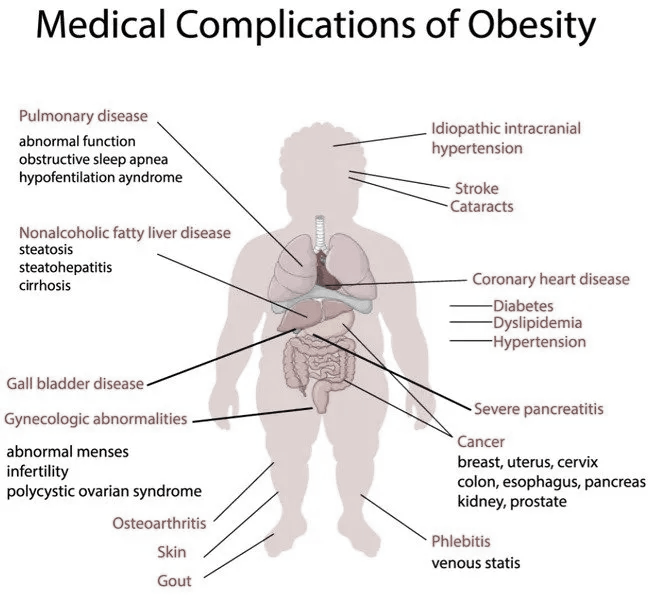New Paragraph
Why Lose Weight?
Impact of Obesity on Your Body and Health
Dangers associated with being overweight or obese are related to many avoidable conditions and illnesses that link to:
- Diabetes
- Chronic Illness
- Metabolic disease
- Lower fertility
- Hormonal disease
- Risk of Cancer
According to the Australian Bureau of Statistics, there are over 1000 deaths each year related to obesity. The possibility of premature death increases greatly with higher weight.
To understand why you need the surgery please watch this video and take control of your health:
Obesity can have a dramatic impact on your body. The conditions related to obesity can be detrimental to your health. However, many of these complications can be avoided or cured through weight loss.
Below are some benefits of losing weight.
Reduced Risk of Heart Attack
Obesity is a major risk factor for heart disease - build up of plaque within your major vessels increases your risk of a heart attack. The risk of plaque formation increases with weight and cholesterol levels.
Large studies show that the risk of heart disease increases with obesity as well as related diseases such as high blood pressure. Those with severe obesity are at a higher risk for coronary artery disease.
Severe obesity is also associated with irregular heartbeats (arrhythmias). These arrhythmias can increase the risk of cardiac arrest.
Diabetes and Related Diseases
People affected by obesity or severe obesity are 5-10 times more likely to have Type 2 Diabetes. This increases if you have a family history of diabetes. Diabetes can cause eye disease, kidney disease as well as peripheral vascular problems.
The effective treatment Type II Diabetes by weight loss surgery results in 66% of sufferers having normal fasting blood glucose levels, serum insulin, Hba1c levels and nearly all will require less medications for their diabetes.
Control Serious Comorbidities
By controlling obesity and diabetes, improved health outcomes can include:
- Hypertension – 59% off all medications
- High cholesterol - less medication required
- Sleep apnea – 3/4 people no longer need CPAP
- Asthma – 1/3 suffer no further symptoms
- Arthritis - vastly improved
- Infertility - large improvement in fertility
- Polycystic Ovarian Syndrome – partial resolution
- Fatty Liver disease - Nonalcoholic Steatohepatitis >50% complete resolution
Other Health Improvements
Conditions that commonly improve include;
- Exercise tolerance improved
- Infections become quicker to heal
- Impotence can be reduced
- Blindness and Eye Disease risks can be reduced (particularly related to diabetes
- Less snoring
Psychological Impact of Weight Loss
Successful weight loss patients are able to engage in activities that they were not able to do before, such as travelling without extender seat belts and activities that have weight limits (roller coaster rides, sky diving etc).
Patient feel better about themselves and are happier in general, thanks to the more fulfilling life that they lead after losing weight.
So the psychological impact of effective weight loss is important and can include:
- Lower rates of depression and depressive episodes
- Improved Body Image and elevated self-esteem - Quality of Life
- Increased social and employment opportunities with less social isolation
- Ability to participate in family activities
Obesity and Cancer
Obesity is believed to cause up to 90,000 cancer deaths per year. As body mass index (BMI) increases, so does the risk of cancer and death from cancer. The common cancers linked to obesity including Liver, Kidney, Thyroid, Prostate, Endometrial, Cervical, Ovarian, Postmenopausal Breast, Colorectal, Esophageal, Pancreatic, Gallbladder cancers, and Non-Hodgkin’s lymphoma, Multiple myeloma, and Leukemia.



